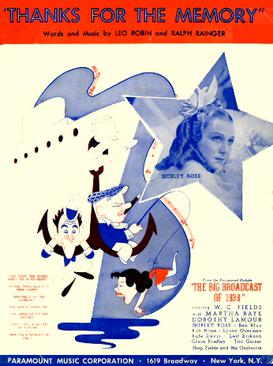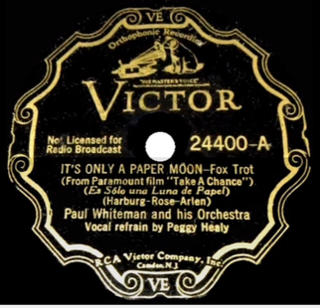Related Research Articles

Road to Morocco is a 1942 American comedy film starring Bing Crosby, Bob Hope and Dorothy Lamour, and featuring Anthony Quinn and Dona Drake. Written by Frank Butler and Don Hartman and directed by David Butler, it’s the third of the "Road to ..." films. It was preceded by Road to Zanzibar (1941) and followed by Road to Utopia (1946). The story is about two fast-talking guys cast away on a desert shore and sold into slavery to a princess. In 1996, Road to Morocco was selected for preservation in the United States National Film Registry by the Library of Congress as being "culturally, historically, or aesthetically significant".

"Singin' in the Rain" is a song with lyrics by Arthur Freed and music by Nacio Herb Brown. Doris Eaton Travis introduced the song on Broadway in The Hollywood Music Box Revue in 1929. It was then widely popularized by Cliff Edwards and the Brox Sisters in The Hollywood Revue of 1929. Many contemporary artists have since recorded the song.
"Some Enchanted Evening" is a show tune from the 1949 Rodgers and Hammerstein musical South Pacific. It has been described as "the single biggest popular hit to come out of any Rodgers and Hammerstein show." Andrew Lloyd Webber describes it as the "greatest song ever written for a musical".
"Buttons and Bows" is a popular song with music written by Jay Livingston and lyrics by Ray Evans. The song was published on February 25, 1948 by Famous Music Corp., New York. The song was written for and appeared in the Bob Hope and Jane Russell film The Paleface and won the Academy Award for Best Original Song. It was originally written with an Indian theme, but was changed when the director said that would not work in the movie. It was a vocal selection on many radio programs in late 1948. It was reprised in the sequel, Son of Paleface, by Roy Rogers, Jane Russell and Bob Hope. In 2004 it finished #87 in AFI's 100 Years...100 Songs survey of the top tunes in American cinema.
"You'll Never Know", sometimes referred to as "You'll Never Know (Just How Much I Love You)" in later years, is a popular song with music written by Harry Warren and the lyrics by Mack Gordon. The song is based on a poem written by a young Oklahoma war bride named Dorothy Fern Norris.

"Shine On, Harvest Moon" is a popular early-1900s song credited to the married vaudeville team Nora Bayes and Jack Norworth. It was one of a series of moon-related Tin Pan Alley songs of the era. The song was debuted by Bayes and Norworth in the Ziegfeld Follies of 1908 to great acclaim. It became a pop standard, and continues to be performed and recorded in the 21st century.
"Long Ago (and Far Away)" is a popular song with music by Jerome Kern, and lyrics about nostalgia by Ira Gershwin from the 1944 Technicolor film musical Cover Girl starring Rita Hayworth and Gene Kelly and released by Columbia Pictures. The song was nominated for the Academy Award for Best Original Song in 1944 but lost out to “Swinging on a Star”, from Going My Way. The song was published in 1944 and sold over 600,000 copies in sheet music in a year. In 2004 it finished #92 in AFI's 100 Years...100 Songs survey of top tunes in American cinema.
"I Get Ideas" is a popular song which has been recorded by various musicians and used in a number of films and television episodes.

"Thanks for the Memory" (1938) is a popular song composed by Ralph Rainger with lyrics by Leo Robin. It was introduced in the 1938 film The Big Broadcast of 1938 by Bob Hope and Shirley Ross, and recorded by Shep Fields and His Orchestra featuring John Serry Sr. on accordion in the film and vocals by Bob Goday on Bluebird Records. Dorothy Lamour's solo recording of the song was also popular, and has led to many mistakenly believing over the years that it was she who sang the tune with Hope in the film.

"It's Only a Paper Moon" is a popular song published in 1933 with music by Harold Arlen and lyrics by Yip Harburg and Billy Rose.

"My Buddy" is a popular song with music written by Walter Donaldson, and lyrics by Gus Kahn. The song was published in 1922 and early popular versions were by Henry Burr (1922), Ernest Hare (1923) and Ben Bernie.
"Don't Fence Me In" is a popular American song written in 1934, with music by Cole Porter and lyrics by Robert Fletcher and Cole Porter. Members of the Western Writers of America chose it as one of the Top 100 Western songs of all time.
"Let's Call the Whole Thing Off" is a song written by George Gershwin and Ira Gershwin for the 1937 film Shall We Dance, where it was introduced by Fred Astaire and Ginger Rogers as part of a celebrated dance duet on roller skates. The sheet music has the tempo marking of "Brightly". The song was ranked No. 34 on AFI's 100 Years...100 Songs.
"Moonlight Becomes You" is a popular song composed by Jimmy Van Heusen with lyrics by Johnny Burke. The song was written for the Paramount Pictures release Road to Morocco (1942) and published in 1942 in connection with the film. Vic Schoen wrote the arrangement.

"The Gold Diggers' Song " is a song from the 1933 Warner Bros. film Gold Diggers of 1933, sung in the opening sequence by Ginger Rogers and chorus. The entire song is never performed in the 1933 movie, though it introduces the film in the opening scene. Later in the movie, the tune is heard off stage in rehearsal as the director continues a discussion on camera about other matters.
"Thank Heaven for Little Girls" is a 1957 song written by Alan Jay Lerner and Frederick Loewe and associated with Maurice Chevalier, its original performer. It opened and closed the 1958 film Gigi. Alfred Drake performed the song in the 1973 Broadway stage production of Gigi, and in the 2015 revival, it was sung as a duet between Victoria Clark and Dee Hoty.

"I'm an Old Cowhand (From the Rio Grande)" is a comic song written by Johnny Mercer for the Paramount Pictures release Rhythm on the Range and sung by its star, Bing Crosby. The Crosby commercial recording was made on July 17, 1936, with Jimmy Dorsey & his Orchestra for Decca Records. It was a huge hit in 1936, reaching the No. 2 spot in the charts of the day, and it greatly furthered Mercer's career. Crosby recorded the song again in 1954 for his album Bing: A Musical Autobiography.
Members of the Western Writers of America chose it as one of the Top 100 Western songs of all time. It has also been covered by numerous jazz musicians, including Sonny Rollins, Monty Alexander, Joshua Redman, and John Scofield.
"Personality" is a popular song with lyrics by Johnny Burke and music by Jimmy Van Heusen. It was written for the 1946 film Road to Utopia, and Dorothy Lamour performed it in the movie. Van Heusen said that he wrote the song with a limited vocal range to accommodate Lamour.
"The Second Time Around" is a song with words by Sammy Cahn and music by Jimmy Van Heusen. It was introduced in the 1960 film High Time, sung by Bing Crosby with Henry Mancini conducting his orchestra, and was nominated for the Academy Award for Best Original Song. It lost out to "Never on Sunday".

Selections from Road to Utopia is a studio album of phonograph records by Bing Crosby released in 1946 featuring songs that were presented in the American musical comedy film Road to Utopia. However, the song "Road to Morocco" came from the film of the same name and was not actually used in Road to Utopia. Another song - "Goodtime Charlie" - was sung by Crosby and Bob Hope in the film but was not commercially recorded. The songs "Would You?" and "Personality" were sung by Dorothy Lamour in the film, not Crosby.
References
- 1 2 "A Bing Crosby Discography". A Bing Crosby Discography. Retrieved December 24, 2015.
- ↑ Whitburn, Joel (1986). Pop Memories 1890-1954 . Record Research Inc. p. 110. ISBN 0-89820-083-0.
- ↑ "AFI'S 100 YEARS...100 SONGS". American Film Institute. Retrieved 2015-03-06.